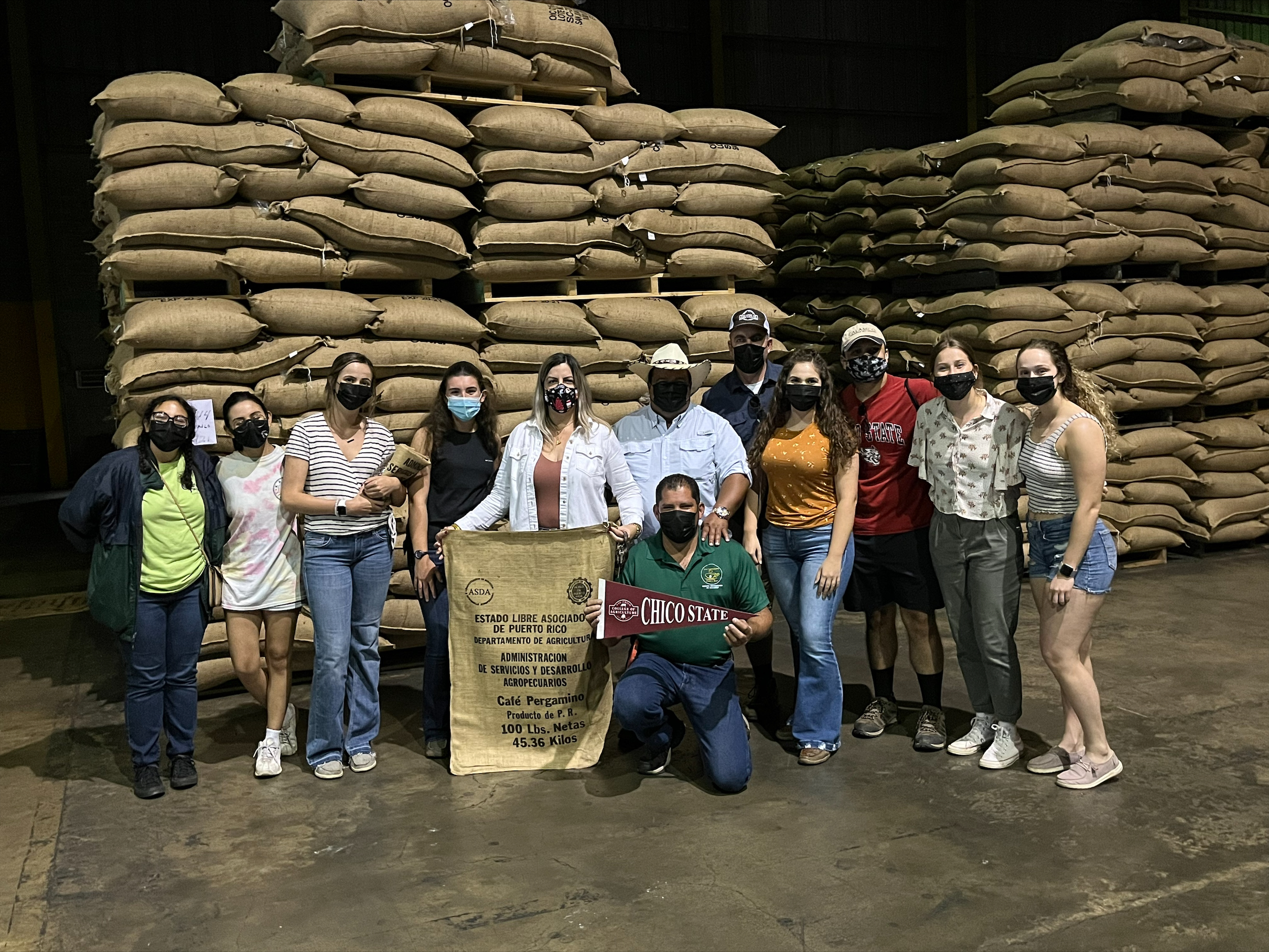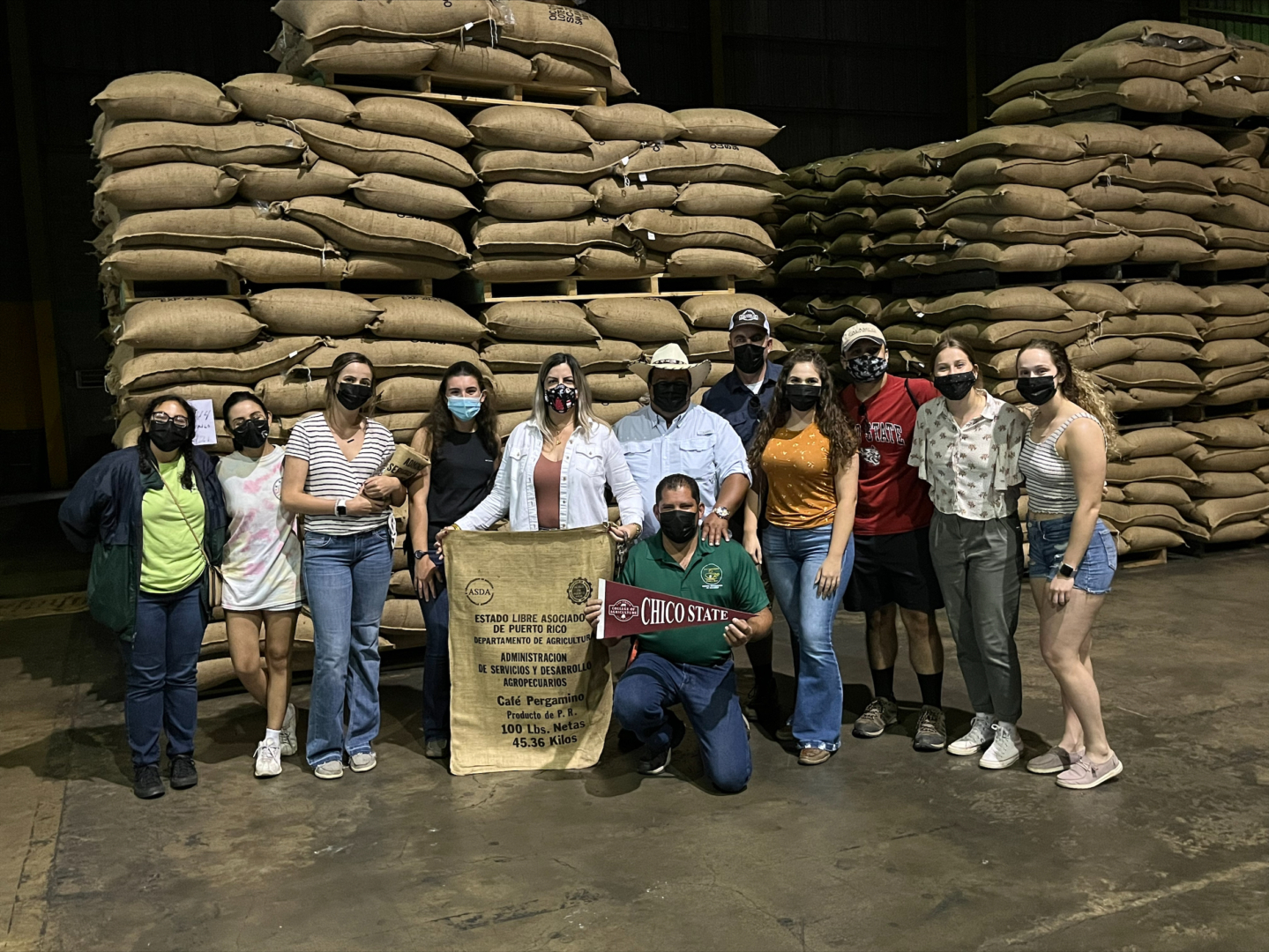Agriculture Majors Explore Puerto Rico in Immersive Trip

By Michelle Borges
A 10-day agricultural exploration trip to Puerto Rico over the winter break pushed eight Chico State students outside their comfort zones, gave them new perspectives on experiential education, and immersed them in a culture they will never forget.
The trip was funded through a Student Learning Fee Grant and led by agricultural education professor Tommy Henderson, with the help of junior agricultural communication and leadership major Michelle Borges.
“To be able to travel to the US territory of Puerto Rico three times with students is truly humbling and life-changing. I find each trip to be so different than the rest when you consider student dynamics, areas of student interest, and personal backgrounds,” Henderson said.
With nearly 900 students in the College of Agriculture, the selection process to determine who would take part was extensive. Mandatory meetings, a lengthy application that included writing prompts, and blind application reviews helped narrow down the group to the final eight students who would use the experience to connect with their peers and jumpstart their own careers in agriculture.
“After several semesters of being virtual with limited events and activities, I was even more excited when this trip proceeded into action,” Borges said. “Dr. Henderson and I put endless hours in planning and preparing. I am so thankful this trip ended with huge success.”
The group, which represented all majors in the College of Agriculture and ranged from sophomore to senior status, included Angel De Trinidad, Claire Broaddus, Emily Ruiz, Lauren Glomson, Morgan Clark, Ryann Vierra, and Valentina Giron.
Broaddus, a junior majoring in agricultural communications, aspired to learn about the perception of agriculture on the island.
“After visiting Puerto Rico, I have a better grasp on how agriculture is perceived there. It is not as popular or widespread of an industry in terms of having large companies producing crops or livestock. There are smaller farmers and ranchers running family-owned businesses,” Broaddus said.
Hot, humid air and light rain welcomed the group as they exited the airport in San Juan, Puerto Rico on December 31. A drive to an ecolodge in the El Yunque National Rainforest landed them at their first home base, where the song of the coqui frogs and a night hike ended the night.

During the first full day on the island, the group was pushed to their limits with a hike through the rainforest. Although the tropical views and immersion in local culture were a common theme throughout the trip, the agricultural takeaways were the main goal.
De Trinidad, a senior majoring in plant and soil science with a specialization in plant pathology, was fascinated to see the diversity in cropping systems in Puerto Rico.
“In classes we are taught about the importance of growing systems that incorporate species diversity and holistic forms of integrated pest management. It was surprising to see that many of these important aspects are commonplace within Puerto Rican agriculture,” De Trinidad said.
Each day on the island allowed students to explore crops unseen in California, such as plantain and coffee farms, while learning from the locals who were willing to share their stories.
“From intercropping to utilization of biological control, Puerto Rican producers are taking advantage of a wide variety of different methods to reduce and solve pest problems. It was incredible to see the concepts we learn in plant and soil science courses being utilized within the field,” De Trinidad said. “It was definitely a great experience that illustrates real-life applications that I will take with me as I work towards becoming a crop pathologist.”
Students had the opportunity to attend a USDA facility to test and grade coffee, where they were able to see the defects in a coffee bean, and learn how coffee is tested to be properly imported and exported on the island.
With a focus on agricultural education, Morgan Clark was amazed by the unique experiences she can take to her future classroom.
“This trip gave me the courage to be a more authentic version of myself. It exposed me to different cultures and situations that I normally would not intentionally put myself in. This has brought me more confidence and an enjoyment of being out of my comfort zone,” Clark said.
Much of the logistics of the trip were made possible through a collaboration with agricultural education professor Edly Santiago from the University of Puerto Rico, Mayaguez. A virtual meet-and-greet and presentation exchange in May with Puerto Rican agriculture students offered Chico State students the chance to learn about the island. Each group of students presented to each other about commodities grown in their area.
After the presentation, Chico State sent a box of California commodities to their counterparts in Puerto Rico, who enjoyed being able to hold the commodities in their own hands.
“All these things will surely find themselves into my future career as well. Being an agriculture teacher is a job that requires confidence, enthusiasm, and an ability to work with others. Not only that, but having to be open and inviting to differing world views and ideas,” Clark said. “This experience provided me interactions with each of those things and it allowed me to cherish the constant diversity and challenges.”
Vierra will be the student-lead for next year’s trip, and she is excited to experience this opportunity again.
“Being a part of the Puerto Rican educational exchange helped me grow not only as a student, but also as an agriculturist. I am looking forward to planning the 2022–23 exchange as it will allow me to network with those who have similar passions while being able to gain a whole new array of experiences,” Vierra said.
Following the trip, students hosted a talk at Chico State to share their experiences with peers, faculty, and staff. Each of the travelers gave a PowerPoint presentation with photographs, their learning objectives, and meaningful takeaways from the trip.
“This powerful experience provides students with more of a global view of agriculture, a chance for them to be nudged out of their comfort zone where learning is maximized, and to build a stronger appreciation for culture and traditions,” Henderson said.
Henderson and Vierra prepared a grant proposal to replicate the trip in the future and give this priceless experience to even more students in the College of Agriculture.
Michelle Borges is the public relations intern and student senator in the College of Agriculture. She is majoring in agriculture, with an option in agricultural science and education, and minoring in agricultural business and journalism.


